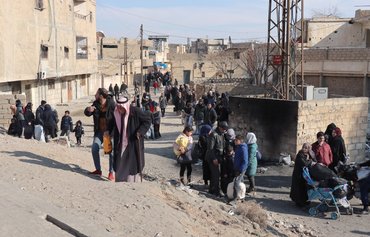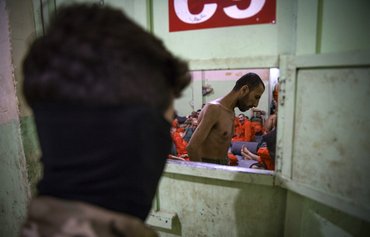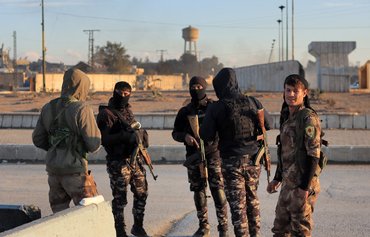Behind the steel door, the cell is packed with haggard, scrawny prisoners in orange jumpsuits lying head-to-toe across every inch of floor space.
An AFP team was given rare access to one of the crowded detention facilities in north-eastern Syria's al-Hasakeh province, where Kurdish forces are holding "Islamic State of Iraq and Syria" (ISIS) suspects.
The extremist group is accused of carrying out widespread atrocities in territory it once controlled across Iraq and Syria, including mass executions, rape, enslavement and torture, much of it filmed for propaganda.
With 5,000 inmates, some of them teenagers, the prison is bursting with the flotsam of the international army of extremists ISIS raised five years ago.
![Suspected members of ISIS gather in a prison cell in al-Hasakeh on October 26th. Kurdish sources say around 12,000 ISIS fighters, including Syrians, Iraqis as well as foreigners from 54 countries are being held in Kurdish-run prisons in northern Syria. [Fadel Senna/AFP]](/cnmi_am/images/2019/10/30/20631-ISIS-prisoners-Syria-600_384.jpg)
Suspected members of ISIS gather in a prison cell in al-Hasakeh on October 26th. Kurdish sources say around 12,000 ISIS fighters, including Syrians, Iraqis as well as foreigners from 54 countries are being held in Kurdish-run prisons in northern Syria. [Fadel Senna/AFP]
Their grey foam mattresses overlap to carpet the cold floor, with only one corner of the cell taken by a basic, half walled-off pit latrine.
The stench is overwhelming in the nearby medical ward, where visitors are given surgical masks at the door.
The prisoners have not heard that on Sunday (October 27th) US President Donald Trump announced the death of ISIS leader Abu Bakr al-Baghdadi in a US raid in north-west Syria.
"They have absolutely no contact with the outside world," says the prison governor, who gave his name as Serhat and asked that the exact location of the facility be withheld.
A prisoner's regrets
Many of the prisoners there are all skin and bones, with some exposing amputation stumps and bandaged wounds.
The prison clinic is as crowded as the other cells.
The condition of the wounded speaks of the intensity of the fighting that led to ISIS's final territorial defeat at the hands of the Syrian Democratic Forces (SDF) in March.
It also reveals the dire conditions experienced by the final denizens of the ISIS "caliphate", who made a last stand in al-Baghouz, 200 kilometres to the south.
Most of the men who have been crammed into this al-Hasakeh detention centre and at least six others across Kurdish-held territory are those who were seen limping to surrender just months ago, starved and mutilated.
"I want to leave the prison and go back home to my family," says Aseel Mathan, a 22-year-old inmate who left his native Wales when he was still 17, to join his brother in the Iraqi city of Mosul, a former ISIS stronghold.
When his brother was killed, he moved across the Syrian border to al-Raqa, the other main hub of the now-defunct extremist proto-state.
"I want to go back to Britain," Mathan said, adding that he wished he had not answered al-Baghdadi's 2014 call to arms.
Fugitive extremists
Kurdish authorities say more than 50 nationalities are represented in the Kurdish-run prisons where more than 12,000 ISIS suspects are now held.
But clandestine ISIS cells that remain at large in the region have continued to carry out sporadic attacks.
Some days, governor Serhat says, fugitive extremists "come near the prison and open fire, just as a way of telling the detainees that they are still there".
Serhat says some inmates started a riot during a meal distribution a month ago, attacking guards after one prisoner drew them in by faking a health issue.
Guiding AFP journalists through the corridors of the prison, one guard is hesitant to even lift the hatch in the cell door.
"These ones are dangerous," he says.
Further down, one cell is reserved for what ISIS propaganda used to call "the cubs of the caliphate", children who were enlisted and trained as fighters.
Some children have been repatriated but the fate of the men remains unclear.
Sick and sorry
Close to a third of the prison's population is sick and needs treatment for a variety of wounds and conditions that include hepatitis and AIDS.
Only around 300 of them can spend the night in the medical ward, among them Aballah Nooman, a 24-year-old Belgian who lifts his T-shirt to show an open wound.
"My organs are spilling out," he says, explaining that he sustained the wound from a fellow extremist who accidentally shot him while cleaning his weapon.
Bassem Abdel Azim, a 42-year-old Dutch-Egyptian, was wounded in an airstrike and cannot use his right leg.
He recounts how he tricked his wife into traveling to the "caliphate" with the promise of a holiday in Turkey.
"I did not tell her, I did not want her to be scared," Abdel Azim says, explaining he has no idea where she and their five children are now.
"I would like to see her again. They can hang me after that, I just want to tell her I am sorry I took them in a country at war."

![A prisoner suspected of being affiliated with ISIS looks out of the opening of a prison cell in Syria's al-Hasakeh on October 26th. [Fadel Senna/AFP]](/cnmi_am/images/2019/10/30/20632-ISIS-prisoner-one-600_384.jpg)
![ISIS suspects gather in an al-Hasakeh prison cell on October 26th. There are 5,000 inmates in this prison, of an estimated 12,000 ISIS fighters being held in Kurdish-run prisons in northern Syria. [Fadel Senna/AFP]](/cnmi_am/images/2019/10/30/20636-ISIS-prisoners-two-600_384.jpg)
![A member of the Syrian Democratic Forces stands guard in a prison where men suspected to be affiliated with ISIS are jailed in north-east Syria. [Fadel Senna/AFP]](/cnmi_am/images/2019/10/30/20640-ISIS-prisoners-three-600_384.jpg)
![Kurdish authorities say more than 50 nationalities are represented in the prisons they run, where more than 12,000 ISIS suspects are being held. [Fadel Senna/AFP]](/cnmi_am/images/2019/10/30/20642-ISIS-prisoners-five-600_384.jpg)






